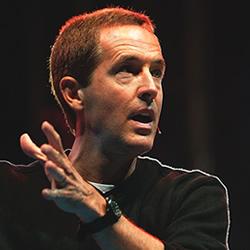None of those reasons, along with a myriad of other reasons that you could come up with, are the Lord’s purpose for His church. We are living in a day of utilitarian religion – where Christ and His Church are utilized for selfish and secondary reasons. We are living in a day when many are trying to define the purpose of the church but they are doing it based on their own understanding and not by relying totally on what God has revealed in His Word.
Robert Schuller has said that the church must be willing to die as a church and be re-born as a mission. Now that sounds real spiritual and might even sound right at first glance, but God has never intended for the church to be a mission. For the church to be a mission would mean that the church would have to become a gathering of the lost rather than a gathering of the saints who have been called out of the world. Schuller put it this way in his book, Self-Esteem: The New Reformation,
For the church to address the unchurched with a theocentric attitude is to
invite failure in mission. The non-churched who have no vital belief in a
relationship with God will spurn, reject, or simply ignore the theologian,
church spokesperson, preacher, or missionary who approaches with Bible in hand,
theology on the brain and the lips, and expects nonreligious persons to suspend
their doubts and swallow the theocentric assertions as fact….It was appropriate
for Calvin and Luther to think theocentrically. After all, “Everyone was in the
church” and the issues were theological not philosophical. For them, the central
issue was, “What is the truth in theology?” The reformers didn’t have to impress
the unchurched so there was no need for them to take the “human needs” approach.
They were a church after all, not a mission. They would “proclaim the Word of
the Lord,” and all had better listen! Time and history have changed all that.
Today the sincere, Christian believer is a minority. So the church must be
willing to die as a church and be born again as a mission. We cannot speak out
with a “Thus saith the Lord” strategy when we are talking to people who couldn’t
care less about the Lord! We cannot start with “What does the text say?” if
we’re talking to persons who aren’t about to affirm respect for or unquestioning
obeisance to “the text.” (pages 12-13).
So for Robert Schuller, the church must stop being a gathering place for the saints and begin being a gathering place for unbelievers. In order for the church to do that it must die as a church, quit preaching God’s Word, and take a “human needs” approach to attract the lost. In other words, Robert Schuller says that the church is to abandon the real purpose that the Lord established her for and needs to learn how to bring in the crowds by learning how to be “Seeker-Sensitive.” In Schuller’s plan the services are geared toward unbelievers and neglects building up the saints in the faith.
Men like Bill Hybels, Rick Warren, Joel Osteen, and many others have taken Schuller’s philosophy and expanded upon it furthering the corruption of the purpose of the church. In his book, The Purpose Driven Church, Rick Warren cleverly shows how to cause your church to die as a church and become a mission without ever setting off too many alarms for those who should know better. Chapter fourteen of Rick Warren’s book is entitled, Designing a Seeker-Sensitive Service. In it he cleverly gives a philosophical reason rather than a theological reason for not preaching the whole counsel of God and for being more concerned with gathering a larger crowd than growing loyal Christians. He said,
“Growing up in a Christian home, I was often frustrated when I broughtWarren went on to ask, “What is the most natural way to increase the number of visitors to your church? And he answered by saying, “The answer is quite simple: Create a service that is intentionally designed for your members to bring their friends to. And make the service so attractive, appealing, and relevant to the unchurched that your members are eager to share it wit the lost people they care about” (page 253).
nonbelieving friends to church. It seemed inevitable that whenever I’d get one
of my friends to attend a service with me, that would be the Sunday my father
would preach on tithing, some guest missionary would show slides, or we’d have a
communion service – not what my unsaved friends needed to hear or experience”
(page 251).
But enough of what men have to say is the purpose of the church; what does God say is the purpose of the church? According to God’s Word is the ministry of the church to evangelize sinners or equip the saints?
First, the church service is the place for the saints to show up (4:11-12a).
The word "church" means, “gathering of the called out ones.” Therefore church services are to be a place of preaching and teaching for the equipping of the saints – and cannot be “Seeker-Sensitive” without departing from the preaching and teaching necessary to equip the saints. Evangelizing the sinner is supposed to take place outside the church services – equipping the saints is what is to take place inside the church services.
Our goal is not to bring people to church first and then to Christ later – our goal is to bring people to Christ first and then they come to church because they are now part of His body and now they love His people. “The one who says he is in the Light and yet hates his brother is in the darkness until now” (1 John 2:9). “We know that we have passed out of death into life, because we love the brethren. He who does not love abides in death” (1 John 3:14).
I’m not saying that lost people can’t come to church and shouldn’t be welcome at our services – they can and they are – but we cannot gear our services around them and refuse to do what God has called us to do. We should be so God-focused that sinners are convicted – (1 Cor. 14:23-25). Or as Gary Gilley put it, "Evangelism was the one biblically mandated function in which believers engaged outside of the assembled church. They did not invite friends to the church gatherings to win them to Christ. The church services were not geared for the unbelievers but for the saints" (source).
Second, the church service is the place for the saints to grow up (4:12b-16)
We grow in our ability to serve the Lord and others (12b) - "For the equipping of the saints, for the work of service, to the building up of the body of Christ."
We grow in the faith – the Word of God (13a) - "Until we all attain to the unity of the faith." We grow together in our knowledge of the Word of God and attain unity in that knowledge.
We grow in the knowledge the Son of God (13b) - "And of the knowledge of the Son of God." Growing together in our knowledge of the Word of God (the faith) leads to growing together in our knowledge of the Son of God. This is essential because this is how we are transformed more and more into His image - we become like what or who we worship!
We grow in Christ-likeness (13c) - "To a mature man, to the measure of the stature which belongs to Christ." As we grow in our knowledge of the Word of God we grow in our knowledge of the Son of God and are transformed by the Spirit of God as we behold the glory of the Lord (2 Corinthians 3:18).
We grow in discernment (14) - "As a result, we are no longer to be children, tossed here and there by waves and carried about by every wind of doctrine, by the trickery of men, by craftiness in deceitful scheming." The growing saint will begin to be able to know the difference between theology and philosophy; between sound doctrine and strange doctrine; between true teachers and false teachers; and between truth and error.
We grow in truth (15) - "But speaking the truth in love, we are to grow up in all aspects into Him who is the head, even Christ." Jesus is truth and as we grow in all aspects into Him we grow in truth.
We grow in love (16) - "From whom the whole body, being fitted and held together by what every joint supplies, according to the proper working of each individual part, causes the growth of the body, for the building up of itself in love." We learn how interdependent God has made us of each other and we learn to love each other and build up the church in love.
Third, the church service is the place for the saints to clean up (4:17-24)
It is in the church service that we learn to take off our grave clothes and put on our resurrection clothes. This is the business of the Christian and the church. We are to help people who have been called out of death into life to take off their grave clothes. After Jesus called Lazarus out of the tomb, He told the people standing around to “Unbind him, and let him go.” (John 11:43-44) – “And when He had said these things, He cried out with a loud voice, “Lazarus, come forth.” He who had died came forth, bound hand and foot with wrappings; and his face was wrapped around with a cloth. Jesus said to them, “Unbind him, and let him go.”
We should no longer look like, talk like, or smell like the lost and dead world. We should put on our resurrection clothes and dress up to the high and holy calling that we have as children of God. We should engage in helping others to get out of the tomb and out of their grave clothes. After all, this is what we have been commissioned to do by our living Lord and Savior. This is the purpose of the church and we cannot do this if we are always attempting to “evangelize the sinner” rather than equipping the saints.
I’m reminded of a poster that pictured some middle-eastern men out in front of their village with a Jeep with its hood up and these men were looking under the hood at the engine. And the caption below this picture said, “Who cares whether we know how it’s supposed to work? We’re going to take a crack at fixing it.” (See it here). That is exactly what is going on with the doctrine of the Church today with all these arising apostate movements. They are trying to tell us how to do Church when they don’t know how it’s supposed to work. Let’s do Church God’s way and let the saints show up, grow up and clean up for the glory of God and His kingdom.
Now to Him who is able to do far more abundantly beyond all that we ask or think, according to the power that works within us, to Him be the glory in the church and in Christ Jesus to all generations forever and ever. Amen.




